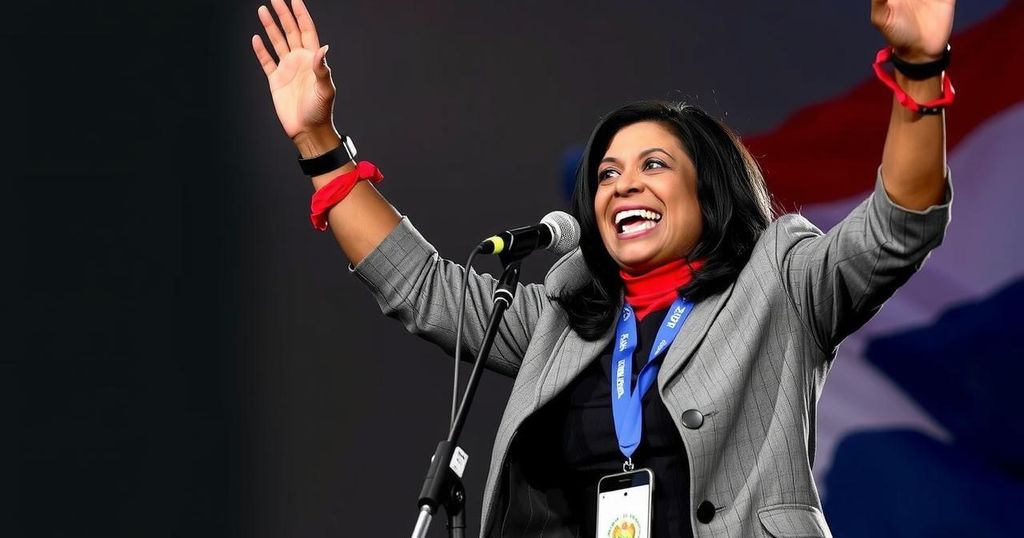Yamandú Orsi Elected President in Uruguay’s Competitive Runoff Election
Yamandú Orsi has won a tight presidential election in Uruguay, defeating Álvaro Delgado, with 49% of votes against 46%. His victory represents a shift in leadership towards the left amidst rising global anti-incumbent sentiments. Orsi plans to implement moderate reforms and aims for unity among the citizenry, while promising to address economic challenges. Voter turnout was an impressive 90%, reflecting the country’s compulsory voting requirements. Outgoing President Luis Lacalle Pou has acknowledged the victory and pledged a smooth transition.
In a closely contested runoff election, leftist candidate Yamandú Orsi has secured a decisive victory in Uruguay, defeating Álvaro Delgado of the conservative ruling coalition. Orsi, a former history teacher and twice elected mayor under the Broad Front coalition, garnered just over 49% of the votes compared to Delgado’s 46%. This election result signifies a shift in the political landscape amid global trends of rising anti-incumbent sentiment. As Orsi addressed a jubilant crowd, he emphasized unity among Uruguay’s 3.4 million citizens, acknowledging the need to include voices of those who may feel disenfranchised by the election outcome. The election saw a remarkable voter turnout of 90%, reflective of Uruguay’s compulsory voting laws.
Despite the fervor seen in other countries, the Uruguayan campaign remained moderate, with Orsi’s policies echoing the earlier accomplishments of the Broad Front during its previous governance between 2005 and 2020. This period was marked by significant economic growth and groundbreaking social reforms, such as the legalization of abortion, same-sex marriage, and marijuana sales. Outgoing President Luis Lacalle Pou, who cannot seek consecutive terms, acknowledged Orsi’s win, pledging a smooth transition.
Orsi has signaled intentions to implement reforms, including tax incentives to attract foreign investments and changes to social security, while also indicating a reassessment of trade relations with China. His campaign strategically addressed growing public frustration around economic challenges, crime, and stagnant wages, a concern that ultimately likely influenced the election’s outcome. Supporters have voiced optimism regarding Orsi’s leadership for future improvements in social conditions and economic opportunities for younger generations.
Delgado’s campaign, which promised continuity of the incumbent administration’s pro-business policies, could not resonate enough with the electorate, leading to a perceived discontent with the current leadership. As President-elect, Orsi aims to cultivate a spirit of dialogue and cooperation in his administration as it prepares to officially begin on March 1, 2025.
Yamandú Orsi’s victory can be interpreted as a reflection of evolving political dynamics within Uruguay, amidst a backdrop of global discontent with incumbent governments. His administration will be tasked with addressing pressing economic issues and fostering inclusivity in a politically diverse landscape.
Yamandú Orsi’s election victory comes during a year marked by significant political changes in various countries, often characterized by a shift away from established political parties. Orsi’s Broad Front coalition previously governed Uruguay from 2005 to 2020, achieving notable social and economic reforms. His win speaks to the electorate’s dissatisfaction with the post-pandemic economic climate, particularly with inflation and job insecurity, which have also influenced broader voter behavior globally. The implications of his policies will largely be observed as they unfold in contrast to the previous administration’s approach, particularly in economic and social welfare areas. Moreover, Orsi’s background as a former history teacher provides a perspective grounded in educational values, potentially influencing his governance style.
Yamandú Orsi’s victory as President-elect of Uruguay signifies a pivotal shift in the country’s political direction, with expectations for renewed focus on inclusive policies and moderate reforms. As he prepares to lead a country grappling with economic challenges and a desire for social improvement, Orsi’s approach will be essential in fostering unity among the diverse citizenry of Uruguay. His administration’s success will largely depend on navigating the complexities of the current socio-economic landscape while addressing the aspirations of all citizens. The broader trends observed in this election are indicative of a global desire for change, aligning with similar electoral outcomes elsewhere. As he embarks on this new political journey, Orsi’s promises of dialogue and collaboration will be critical in successfully managing the transition and implementing his agenda in a divided landscape.
Original Source: indianexpress.com




Post Comment